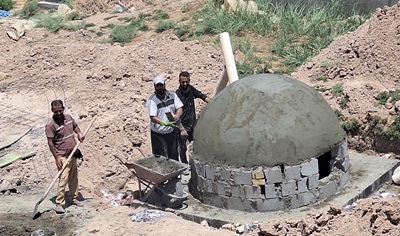
A research team from the Desert Studies Center, led by Professor Saif El-Din Abdel-Razzaq Salem, and supported by Engineer Iyad Al-Marawi from the Engineering Projects Directorate, has begun implementing an on-site biogas digestion unit.
Biogas technology is a modern, environmentally friendly innovation that relies on the anaerobic decomposition of organic matter by bacteria under controlled thermal conditions and in the absence of oxygen. This process produces a flammable gaseous mixture consisting primarily of methane and carbon dioxide, commonly known as biogas, in addition to producing a nutrient-rich liquid fertilizer. Biogas is generated naturally when organic matter decomposes under anaerobic conditions, a process that occurs in nature (such as deep lake sediments and soil layers) and industrial environments (such as dairy waste, sewage systems, and solid waste landfills). Biogas typically contains 60% methane, 40% carbon dioxide, and trace amounts of nitrogen, hydrogen, and hydrogen sulfide. If left untreated, these gases escape into the atmosphere and contribute to greenhouse gas emissions.
Biogas digesters provide an efficient way for livestock-owning households to manage organic waste and wastewater while generating usable energy. The gas can be used for cooking and lighting through specially designed stoves and lamps. Additionally, diesel or gasoline engines can be adapted to run on biogas.
Direct Benefits of Biogas Digesters:
· 1. Energy savings (reducing the need for kerosene, gas, electricity, wood, or coal).
· 2. Commercial use of biogas to generate income.
· 3. Production of fertilizers that support agriculture or are sold.
Qualitative Benefits:
· 1. Improved hygiene due to the elimination of pathogens during digestion.
· 2. Providing lighting in rural areas not connected to the electricity grid.
· 3. Achieving energy independence for farmers.
· 4. Improved livestock health through improved sanitation.
· 5. Improved soil structure through the use of digested organic fertilizers.
Regional Benefits:
· 1. Decentralized energy systems directly managed by users.
· 2. Reducing deforestation by reducing dependence on fuelwood.
· 3. Enhancing agricultural productivity.
· 4. Creating employment opportunities and additional income for rural farmers.
· 5. Developing infrastructure in rural areas.
· 6. Raising environmental awareness among farmers.
Key Benefits of Biogas Plants:
· 1. Reliable power generation.
· 2. Providing balanced natural fertilizer.
· 3. Environmental protection through sustainable waste management.
· 4. Improving public health and rural hygiene.
Biogas Digesters: A Modern Energy Source
Biogas technology is constantly evolving.
Suitable for the technical and economic capabilities of farmers in developing countries.
Compatible with the future needs of sustainable economies and ecological balance.
However, biogas systems can only meet expectations if they are properly designed and implemented.


Topics may interest
Implementing the Biogas ProjectCotton Variety Development and Breeding Committee Meeting
Towards Environmental Sustainability: The Green Belt Project Around Anbar Governorate - Ramadi as a Model
National Cotton Development Program
Afforestation and Establishment of Oases and Nature Reserves Along the Overland Hajj Route and the Al-Jadida Arar Border Area
Increasing and Declining Wild Plant Species in the Western Desert of Iraq
Studying land resources in the areas surrounding Lake Haditha in the Western Iraqi Desert for comprehensive sustainable development
A Study on the Status of Wild Medicinal Plants and Their Potential for Sustainable Development in the Desert Environment